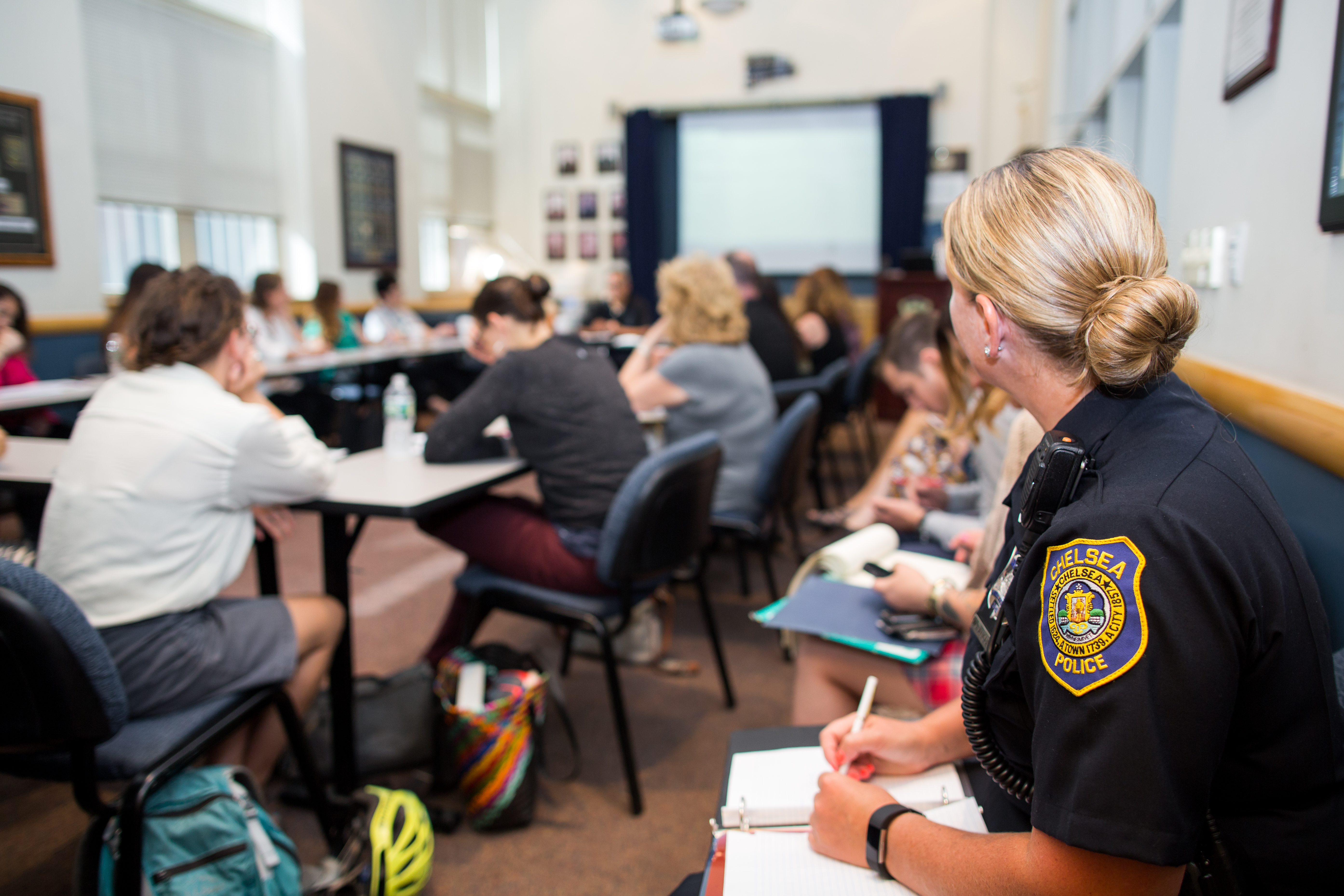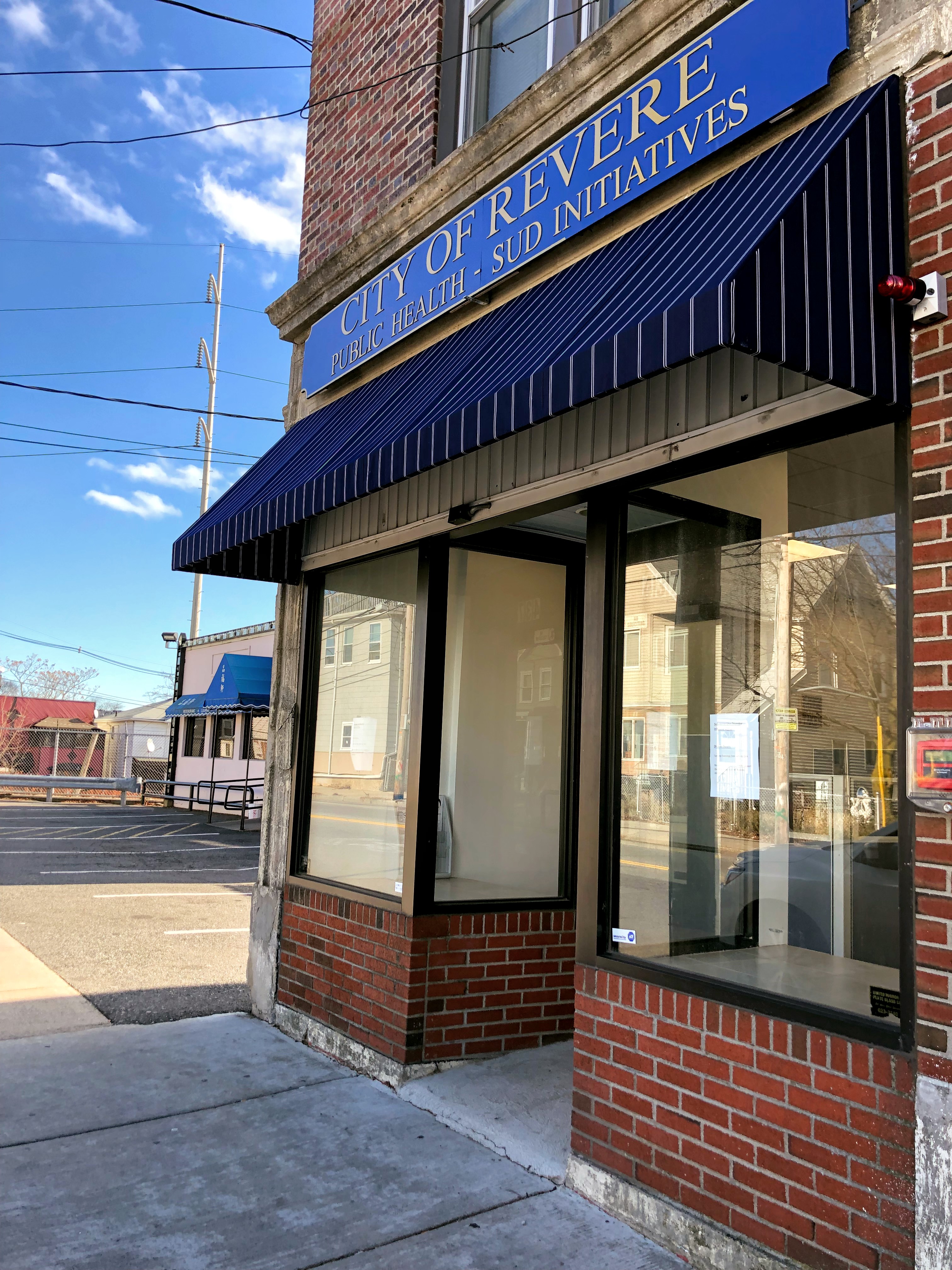

The Chelsea Hub and Revere's Substance Use Disorder Initiatives are highlighted in MAPC's Connecting People to Services.
Cities and towns in Greater Boston are on the front line in addressing the impacts of the opioid epidemic. Local police and fire are often first on the scene to revive individuals who have overdosed. Municipal public health, public safety, social work, and recovery professionals are often directly engaged with residents suffering from opioid use disorders (OUDs) and their loved ones.. Because local officials are closest to the challenges raised by the crisis they are often seen as a resource in connecting people with OUDs to continuing treatment options, harm reduction programs, and long-term recovery services.
Effectively connecting residents in need to those services is not, however, as simple as it sounds. That’s why the Metropolitan Mayors Coalition identified “connecting people to needed services” as a key area in which to share best practices and strategies for addressing the opioid crisis. In response, MAPC conducted interviews with public officials on the front lines of the opioid crisis in our cities and towns and produced a pamphlet summarizing best practices, examples, and tips.
To coincide with the release of the pamphlet on Friday, April 26, MAPC and the Metropolitan Mayors Coalition gathered together about three dozen people – mostly local officials – for a workshop to share experiences and lessons learned.

While not every city or town has the same resources or the exact same problems, there are small steps that even the most resource-strapped community can implement to help steer people with OUD to services they can benefit from. That’s the basis of the “Connecting People to Services” booklet, which highlights four local programs: the Chelsea Hub, Boston’s Providing Access to Addictions Treatment and Support (PAATHS), Arlington Post-Overdose Outreach and Treatment Placement, and Revere’s Substance Use Disorder Initiatives (SUDI).
Among all four programs – and others that MAPC studied – three key best practices emerged: having a thorough understanding of local treatment options to refer people to, communication between those addressing the opioid crisis from different angles, and deliberately planning a strategy based on the community’s needs.
MAPC also identified response strategies that can be scaled depending on a municipality’s resources. These included steps such as hiring a part-time or full-time outreach worker, creating a resource center, strategic staffing, and engaging in tailored post-overdose outreach.
At the workshop, attendees from 12 communities - Acton, Arlington, Boston, Cambridge, Chelsea, Everett, Gloucester, Malden, Medford, Revere, Somerville, Winthrop - heard from representatives of the four programs highlighted in the “Connecting People to Services” booklet, discussed what they were doing in their own towns, and brainstormed about what action steps would be needed to implement best practices in their own communities.
Scenes from the workshop:
The workshop began with a panel presentation by Rebecca Wolfe of Arlington Post-Overdose Outreach and Treatment Placement, Captain David Batchelor of the Chelsea Police Department HUB Program, Theresa Young of Boston PAATHS, and Julia Newhall of Revere SUDI. The four gave brief overviews of their programs and shared lessons learned in building them.
Wolfe described how the Arlington Police Department employed her as a mental health jail diversion clinician, often taking her along on mental health-related calls. Realizing that people overdosing were most like to overdose again, Wolfe began following up with them to provide ongoing support and connecting to services.
Chelsea’s model is a little different. The Hub is designed as a communication network between law enforcement, schools, local hospitals, housing, child protection services, and local mental health and addiction services and as a means to identify individuals at extremely high risk
“Rather than wait for a bad thing to happen, we try to get to people and connect them to services before people make the 911 call,” said Captain Batchelor.
In Boston, the Public Health Commission created a one-stop shop for anyone seeking access to or information about addiction treatment. The PAATHS team can make referrals to any level of care and any type of substance use treatment. The location – right next door to a needle exchange – saw 12,000 walk-ins last year. PAATHS successfully places 10-20 people into treatment daily, helping them navigate barriers like lack of insurance, lack of identification, and lack of transportation, and all services are free.
“The goal of PAATHS is to work ourselves out of existence because we’ve identified the gaps in care and closed them,” said Young.
Smaller communities can also make a difference by connecting people. Revere's SUDI office had to be innovative to leverage limited and splintered funding sources ito design a program around the community’s needs. Their multifaceted approach includes a drop-in center open Tuesday evenings, resource coordinator, overdose outreach worker, naloxone and clean needle distribution, community education, peer and family support, and recovery coaching. The service coordinator, community outreach worker, and a recovery coach all work less than 15 hours per week.
The four panelists highlighted the importance of relationships with local treatment providers and other agencies and the importance that housing and employment can have on addressing addiction and ensuring long-term recovery. They also described service gaps in treatment availability after detox, connecting people to housing and jobs, and connecting people without money or insurance to effective treatment.
Following the presentation, workshop attendees gathered into groups to brainstorm ideas for what they could do to implement best practices and better connect people with OUD to services in their communities. They examined the work currently being done in their cities and towns, discussed ideas to improve their methods of connecting people, and thought about who would need to be included in discussions to implement new programs or share knowledge.
If a community is interested in expanding its efforts to connect people to services, MAPC can help. MAPC can offer technical assistance to communities working to develop programs and support communities looking to form partnerships with nearby cities and towns to offer services. MAPC will continue to work with area communities to explore how they can better connect people in need to a range of harm reduction, treatment, and long-term recovery services.
About the MMC Opioid Taskforce
The Metropolitan Area Planning Council has been working in support of the 15 cities and own that make up the Metropolitan Mayors Coalition (MMC) as they address the opioid epidemic. Mayors, managers, and senior public health and public safety officials identified four areas they wanted to work on with MAPC: funding reform, recovery coach certification and reimbursement reform, improved communication and information sharing, and connecting people to needed services. Read more about the municipal response to the opioid epidemic here.
